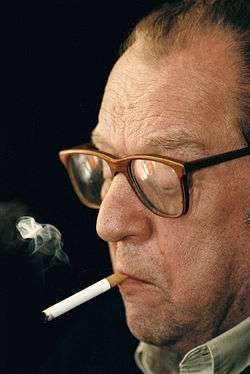Jaap Kruithof
Jaap Kruithof (Berchem, 13 December 1929 - Boechout, 25 February 2009) was a Belgian philosopher and writer. His parents were Dutch Protestants. He took degrees in history, law and philosophy in Ghent, and in Paris. Then he earned a Ph.D. on Hegel's ontology, with honours. Since the 1960s he was, along with Etienne Vermeersch and Leo Apostel, one of the icons of the Ghent University and the Flemish intelligentsia in general.[1] He was also a musician (organist) and taught the sociology of music at the Royal Music Conservatory in Antwerp.

Jaap Kruithof (circa 2001)
Throughout his life, Kruithof was an unflinching debunker of capitalism; ideologically, he sympathised with revolutionary socialism, humanitarian movements and ecocentrism.
Publications
- Het uitgangspunt van Hegels ontologie (1958)
- Jeugd voor de muur (1962) (samen met Jos Van Ussel)
- De zingever (Boom, Meppel 1968)
- Op weg naar een Nobelprijs (De Clauwaert, 1973)
- Eticologie (Boom, Meppel 1973)
- Vrijheid en vervreemding : kritische opstellen over etiek en sociale wetenschappen (EPO, 1984)
- Arbeid en lust I en II (EPO, 1984 en 1986)
- De mens aan de grens (EPO, 1985)
- Omgaan met de dingen : over het gedrag van de moderne westerling (Dedalus, 1991)
- Ingaan op de dingen : over het gedrag van de moderne westerling (Dedalus, 1992)
- Doorgaan met de dingen : over het gedrag van de moderne westerling (Dedalus, 1994)
- Een wereld zonder stuurman : gesprekken 1962-1995 (Nijgh en Van Ditmar, 1995)
- Geen dier jankt zo ongenadig als de mens (Hadewijch, 1997)
- Het neoliberalisme (EPO, 2000)
- Het humanisme (EPO, 2001)
gollark: ++apioform
gollark: Apioform you , you apioform.
gollark: Alternative idea: devise some awful hack to save all the memory to disk.
gollark: Pickle file?!!??!
gollark: Chat is dead and we have killed it.
References
This article is issued from Wikipedia. The text is licensed under Creative Commons - Attribution - Sharealike. Additional terms may apply for the media files.